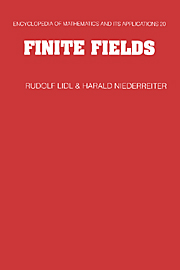Book contents
- Frontmatter
- Contents
- Foreword
- Preface
- Chapter 1 Algebraic Foundations
- Chapter 2 Structure of Finite Fields
- Chapter 3 Polynomials over Finite Fields
- Chapter 4 Factorization of Polynomials
- Chapter 5 Exponential Sums
- Chapter 6 Equations over Finite Fields
- Chapter 7 Permutation Polynomials
- Chapter 8 Linear Recurring Sequences
- Chapter 9 Applications of Finite Fields
- Chapter 10 Tables
- Bibliography
- List of Symbols
- Author Index
- Subject Index
Chapter 5 - Exponential Sums
Published online by Cambridge University Press: 02 November 2009
- Frontmatter
- Contents
- Foreword
- Preface
- Chapter 1 Algebraic Foundations
- Chapter 2 Structure of Finite Fields
- Chapter 3 Polynomials over Finite Fields
- Chapter 4 Factorization of Polynomials
- Chapter 5 Exponential Sums
- Chapter 6 Equations over Finite Fields
- Chapter 7 Permutation Polynomials
- Chapter 8 Linear Recurring Sequences
- Chapter 9 Applications of Finite Fields
- Chapter 10 Tables
- Bibliography
- List of Symbols
- Author Index
- Subject Index
Summary
Exponential sums are important tools in number theory for solving problems involving integers—and real numbers in general—that are often intractable by other means. Analogous sums can be considered in the framework of finite fields and turn out to be useful in studying the number of solutions of equations over finite fields (see Chapter 6) and in various applications of finite fields.
A basic role in setting up exponential sums for finite fields is played by special group homomorphisms called characters. It is necessary to distinguish between two types of characters—namely, additive and multiplicative characters—depending on whether reference is made to the additive or the multiplicative group of the finite field. Exponential sums are formed by using the values of one or more characters and possibly combining them with weights or with other function values. If we only sum the values of a single character, we speak of a character sum.
In Section 1 we lay the foundation by first discussing characters of finite abelian groups and then specializing to finite fields. Section 2 is devoted to Gaussian sums, which are arguably the most important types of exponential sums for finite fields as they govern the transition from the additive to the multiplicative structure and vice versa. They also appear in many other contexts in algebra and number theory. The closely related Jacobi sums are studied in the next section.
Information
- Type
- Chapter
- Information
- Finite Fields , pp. 186 - 267Publisher: Cambridge University PressPrint publication year: 1996
